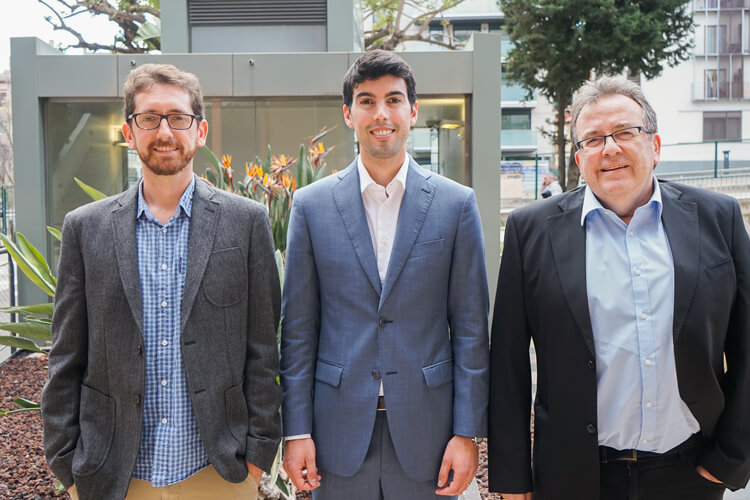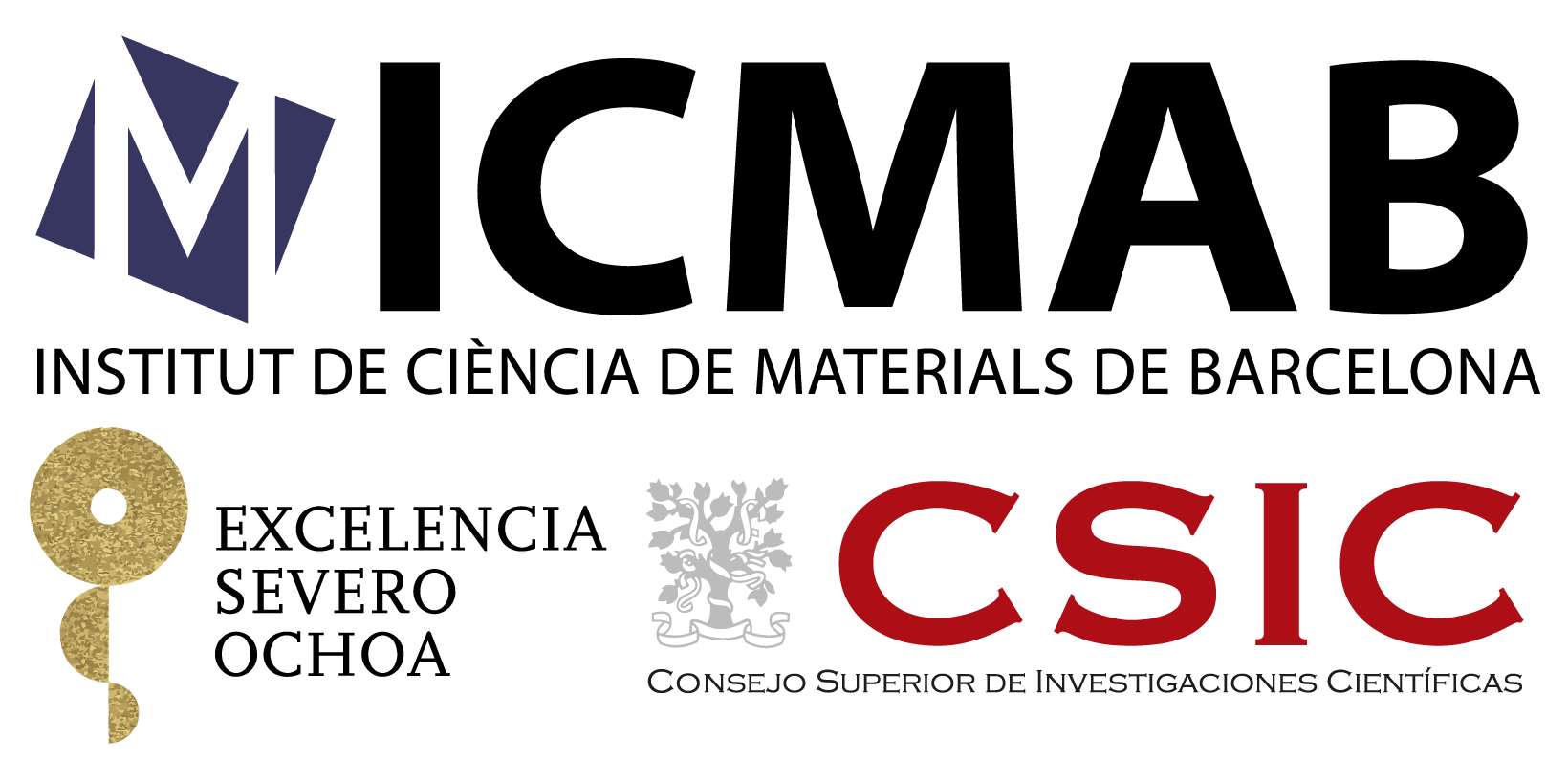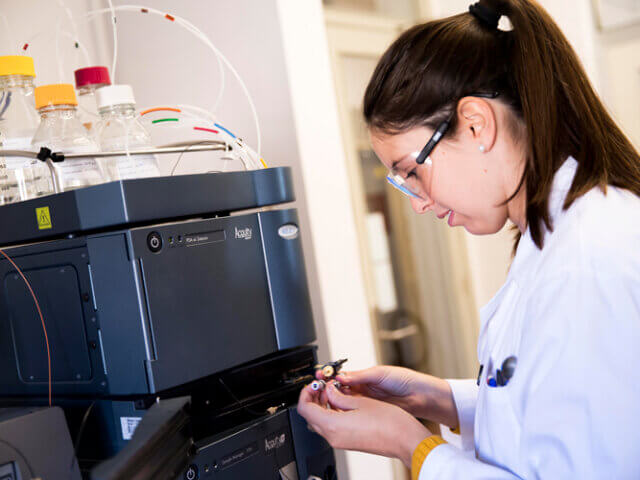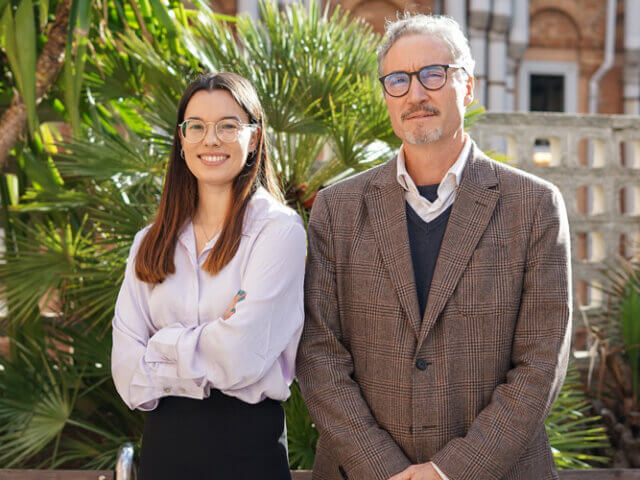New Synthetic Methodologies for Tyrosine Kinase Inhibitors in Pancreatic Cancer
Pancreatic ductal adenocarcinoma (PDAC) is one of the most aggressive types of cancer that exists and is the fourth leading cause of mortality from cancer. Although it is not very frequent, the survival time for patients is very low as they do not present symptoms until the final stages and metastases develop easily, thus the prognosis is very bad when detected. In addition, current medicines for fighting against it are ineffective and merely palliative in nature.
There are now new types of tyrosine kinase inhibitor drugs, yet they are still inefficient as they are too selective in the multiple existing targets since when one tyrosine kinase is inhibited others respond and overexpress themselves to counteract the absence of the one that has been inhibited, causing uncontrolled growth. For this reason, the search for potential multitarget TKI inhibitors to fight against PDAC is crucial.
Researchers from the Pharmaceutical Chemistry Group (GQF) at the IQS School of Engineering are experts in searching for and developing, both from the computational and synthetic pathways, tyrosine kinase inhibitors (TKIs) based on pyrido[2,3–d]pyrimidine structures, a family of compounds with great interest due to their similarity to the nitrogenous bases found in DNA, RNA, or nucleotides such as ATP.
It is within this context that Dr Claudi de Rocafiguera Viladecans conducted his doctoral thesis, entitled Development of new methodologies for the synthesis of pyrido[2,3-d]pyrimidin-7(8H)-ones with tyrosine kinase capacity in pancreatic cancer. The thesis was carried out in the Department of Organic and Pharmaceutical Chemistry at IQS, supervised by Dr Jose I. Borrell Bilbao and Dr Raimon Puig de la Bellacasa Cazorla, with the main objective of finding a multitarget inhibitor for PDAC.
Image from Dr de Rocafiguera’s research on the cover of the journal Organic & Biomolecular Chemistry
New synthetic strategy for obtaining pyrido[2,3-d]pyrimidines
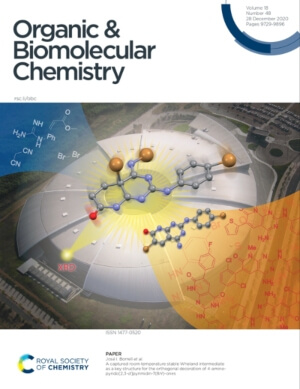
First of all, in his thesis, Dr De Rocafiguera established an improved route for general synthesis of pyrido[2,3-d]pyrimidin-7(8H)-ones by introducing halogenated substituents in specific positions of the general structure with the aim of being able to endow them orthogonally in the final stages, introducing the desired substituents that allow a better interaction with the therapeutic targets. In this way, it is possible to have a general methodological strategy that allows access to biological activity systems more quickly, thus avoiding having to make a de novo synthesis for each product.
On the other hand, pyrido[2,3-d]pyrimidin-7(8H)-ones unsubstituted in the lactam position generally exhibit low solubility due to the formation of hydrogen bridge DADA-ADAD interactions (D=donor, A=acceptor). To facilitate its solubility and support subsequent reactions, N8-alkylated systems were obtained, protected with various photolabile groups, which are easily removable in the last steps of synthesis, thus making it possible to recover the free N8 position again and facilitate the proper biological activity of the system as a point of interaction with the protein.
During the photolabile group removal tests, a photodehydrogenation of the C5-C6 bond of the pyridopyrimidine structure was also observed, a reaction for which there is no general methodology described and which was achieved under mild reaction conditions in this thesis. In collaboration with the group led by Dr José Vidal and Dr Vega Lloveras from the Materials Science Institute of Barcelona (ICMAB/CSIC), the scope of validity of this reaction has been studied and a mechanism for this photodehydrogenation reaction has been proposed, using the Electronic Paramagnetic Resonance (RPE) technique, a mechanism that passes through a radical with a stability of more than a month and without the need for the presence of a photosensitizer, two unusual characteristics.
Biological activity evaluation
Finally, first thanks to the services offered by the company Reaction Biology (enzymatic assay) and subsequently through cellular assays in collaboration with Dr Carlos Semino from the GQF, the evaluation assays of the biological activity of the products synthesized in this research were carried out and possible multitarget TKI inhibitors were searched for among them all. One of these products – dubbed “IQS 080” – has been selected and is currently in the proof-of-concept phase.
In short, Dr de Rocafiguera’s thesis has established a synthetic route that facilitates future synthesis of pyrido[2,3-d]pyrimidines from a common intermediate , discovering and establishing the mechanism of a new photodehydrohalogenation reaction at the C5 and C6 positions of the structure, and finally identifying a candidate multitarget inhibitor against PDAC. This research is continuing with the PreClinIQS080 project (Initial Preclinical Study of IQS080, a candidate drug against pancreatic cancer), and is also funded by the Ministry of Science and Innovation – R&D&i Projects and Proofs of Concept 2022 PDC2022-133188-I00.
Related publication
Claudi de Rocafiguera et al, A captured room temperature stable Wheland intermediate as a key structure for the orthogonal decoration of 4-amino-pyrido[2,3-d]pyrimidin-7(8H)-ones, Org. Biomol. Chem., 2020, 18, 9810-9815.
This thesis has been conducted within the PANCTKI (New multitarget inhibitors in pancreatic cancer therapy) project, with funding from the Spanish Ministry of Science and Innovation – State Research Agency under the National Challenges of Society Plan RTI 2018-096455-B-100.
RELATED PEOPLE:
RESEARCH GROUP
Pharmaceutical Chemistry Group
RELATED PROJECTS
PANCTKI (Nuevos inhibidores multidiana en terapia del cancer de pancreas)

PreClinIQS080 (Estudio Preclínico Inicial de IQS080, un candidato a fármaco contra el cáncer de páncreas)


